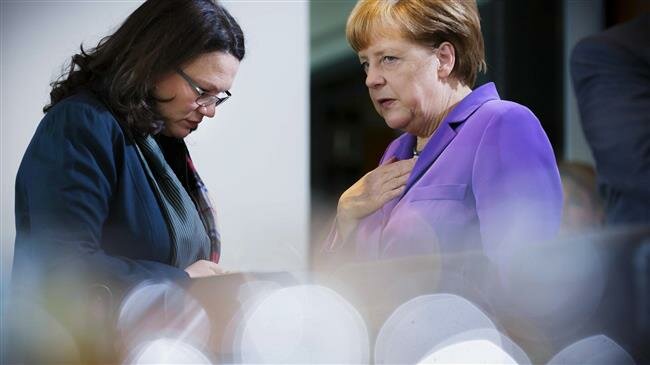German Chancellor Angela Merkel says the government will carry on with its duties with seriousness despite the setbacks her coalition suffered after the surprise resignation of the leader of its junior partner.

Merkel said she respected the “far-reaching” decision by the leader of the Social Democrats (SPD), Andrea Nahles, who said she would step down as party leader on Monday and as head of its parliamentary group the following day.
Nahles announced her resignation in a statement on Sunday, after her party hit an all-time low at the European parliamentary elections last weekend. The SPD finished third after receiving just 15.8 percent of the vote behind Merkel’s Christian Democrats (CDU).
The coalition between the two parties is to last until federal elections in 2021, but Nahles’ resignation could lead her party to leave the coalition — which means the fall of the government and snap elections.
Reacting to the resignation, Merkel — whose conservative Christian Democrats lead the government in coalition with the SPD — said, “I would like to say on behalf of the government, we will continue the government’s work with all seriousness. We will above all do it with a great sense of responsibility.”
Nahles has become under intense criticism from inside the SPD for remaining in the coalition after voters handed her party its worst European election results.
“I took over the chair of the party and parliamentary group in difficult times,” said Nahles, who became party leader in April 2018, adding that “the great deal of feedback I’ve had from the party has shown me that the necessary backing … is no longer there.”
The future of Merkel’s government now depends on Nahles’ successor — who, if elected from the left of the party, could push for a departure from the coalition.
A coalition collapse would then lead to a minority government and, subsequently, to the premature end of the chancellor’s final term.
Olaf Scholz, the vice chancellor and now the most senior SPD politician in Germany, has already ruled out another coalition with the CDU, at least after the next election.
“Three grand coalitions in a row would not do democracy in Germany any good," Scholz told the Tagesspiegel newspaper on Saturday, before Nahles’ announcement. “No one wants a continuation of the current coalition after 2021 — not the citizens, not the CDU and certainly not us Social Democrats.”
A party conference will be required to elect a new leader, which will take some weeks to organize.
LINK: https://www.ansarpress.com/english/11416
TAGS:






























 online news tv
online news tv




